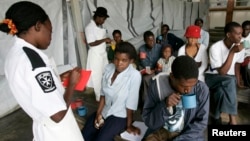HARARE —
The government of Zimbabwe, with help from U.N. agencies and Western donors, is trying to eliminate so-called "neglected tropical diseases" that affect mainly children.
At Tsungubvi Primary School, about 80 kilometers south of Harare, the government has launched a program of eliminating "neglected tropical diseases."
In the background is the voice of Lazarus Dokora, Zimbabwe’s education minister. He is trying to persuade parents that the drugs being administered will not affect their children.
Mashonaland Central province is one of the areas most affected by such diseases. Statistics showing that in some areas, as much as 90 percent of the children have these water-borne diseases, such as bilharziasis.
“This is a major cause of concern for us all. Bilharzia and intestinal worms problem should be addressed comprehensively by improving and modifying environmental determinants that cause reinfection,” said Dokora.
Dokora said he is worried that open defecation and the absence of adequate safe drinking water could undermine this program, which was funded by about $5 million from U.N. agencies and Western donors. The money was spent on drugs that were given to the Zimbabwean government for distribution to clinics and hospitals.
According to the U.N., nearly 70 percent of rural households in Zimbabwe do not have modern sanitation facilities, and about 40 percent of them practice open defecation.
Dr. Portia Manangazira, Zimbabwe’s chief disease control official in the Ministry of Health, said those statistics are worrying.
“These drugs are not cheap - of course the prices have gone down. But you still not want to treat the same person over and over again," said Manangazira. "After treating them, they are going to the same environment that made them sick. So the issue of reinfection is very important. We would want to see, as a ministry of health and child care, a mirroring in the improvement of water and sanitation because these are diseases of poor water and sanitation coverage.”
Zimbabwe lacks the cash to undertake such initiatives, so for now, doctors will try to control the diseases, in hopes the underlying problems can be dealt with in the future.
At Tsungubvi Primary School, about 80 kilometers south of Harare, the government has launched a program of eliminating "neglected tropical diseases."
In the background is the voice of Lazarus Dokora, Zimbabwe’s education minister. He is trying to persuade parents that the drugs being administered will not affect their children.
Mashonaland Central province is one of the areas most affected by such diseases. Statistics showing that in some areas, as much as 90 percent of the children have these water-borne diseases, such as bilharziasis.
“This is a major cause of concern for us all. Bilharzia and intestinal worms problem should be addressed comprehensively by improving and modifying environmental determinants that cause reinfection,” said Dokora.
Dokora said he is worried that open defecation and the absence of adequate safe drinking water could undermine this program, which was funded by about $5 million from U.N. agencies and Western donors. The money was spent on drugs that were given to the Zimbabwean government for distribution to clinics and hospitals.
According to the U.N., nearly 70 percent of rural households in Zimbabwe do not have modern sanitation facilities, and about 40 percent of them practice open defecation.
Dr. Portia Manangazira, Zimbabwe’s chief disease control official in the Ministry of Health, said those statistics are worrying.
“These drugs are not cheap - of course the prices have gone down. But you still not want to treat the same person over and over again," said Manangazira. "After treating them, they are going to the same environment that made them sick. So the issue of reinfection is very important. We would want to see, as a ministry of health and child care, a mirroring in the improvement of water and sanitation because these are diseases of poor water and sanitation coverage.”
Zimbabwe lacks the cash to undertake such initiatives, so for now, doctors will try to control the diseases, in hopes the underlying problems can be dealt with in the future.









